Your web browser does not support web standards.
Faculty Bios
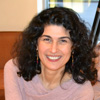
Klejda Bega graduated from Caltech with a BS in Physics with Honors in 1999 and a PhD in Physics in 2004. She did her graduate work in particle physics at SLAC National Accelerator Laboratory, where she was involved in the measurement of parity violation in electron-electron scattering. After graduation she worked as a management consultant, assisting public and private sector clients in projects including strategic sourcing, data analysis, market research, process mapping and redesign, and staff training. She is currently a Postdoctoral Research Fellow at Columbia, conducting research in atomic, molecular and optical physics focusing on precise manipulation of ultracold atoms and molecules in optical lattices.

Logan Brenner is a paleoceanographer/paleoclimatologist interested in reconstructing past oceanic conditions using the geochemistry of stony coral skeletons. She graduated Phi Beta Kappa from Skidmore College in 2012 with a B.A. in Geosciences where she studied stalagmites (cave formations) to develop a history of precipitation in Yucatan, Mexico. She continued to Columbia University and the Lamont-Doherty Earth Observatory, where she received her Ph.D. in 2017, to study coral geochemistry with one project focusing on the hydroclimate off the Pacific coast of Panamá and another on the changing sea surface temperatures in the Great Barrier Reef over the past 25,000 years. As a Science Fellow in Columbia’s Department of Earth and Environmental Sciences, she is currently exploring multi-decadal climate patterns by a series of small islands in the Central Pacific. In addition to her research, Logan is passionate about science communication and the role STEM plays in higher education.

Statia Luszcz Cook studies the atmospheres of planets (and sometimes their moons) through observations across many wavelengths and atmospheric modeling. She earned her B.A. in Astronomy from Cornell University, and her Ph.D. in Astrophysics from the University of California, Berkeley. Previously, Dr. Cook was a postdoctoral fellow at the American Museum of Natural History (AMNH), where she took part in an experiment to search for large, young planets around nearby stars. She is currently a Columbia Science Fellow in the Discipline of Astronomy.

Ellen Crapster-Pregont graduated with a B.A. from Colby College, Maine double majoring in geology and chemistry. She then combined these fields to study the chemistry and processes of the early Solar System as preserved in meteorites at the American Museum of Natural History while obtaining a Ph.D. from Columbia University, New York. While pursuing her degree, she was actively involved with processing the X-ray Spectrometer (XRS) datasets from NASA’s MESSENGER mission to Mercury and was a volunteer for the Antarctic Search for Meteorites during the 2015-2016 season recovering meteorites from the ice fields of Antarctica. Her current research focuses on determining the distribution of the lanthanide series, rare earth elements among the components (chondrules, refractory inclusions, matrix, etc.) of chondrites to better understand the high temperature processes operating in the early Solar System that ultimately resulted in the configuration of bodies we observe today.
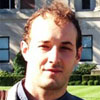
Pierre Cristofari graduated from the Paris Diderot University with a PhD in Astrophysics in 2013. During his PhD, Pierre worked in the field of gamma-ray astronomy and the acceleration of cosmic rays at supernova remnants. At Columbia, he is a Science Fellow in the Astrophysics Department, investigating high-energy astrophysics and cosmic-ray physics.

Peter de Menocal is Dean of Science for the Faculty of Arts & Sciences at Columbia University, and the Thomas Alva Edison/Con Edison Professor in the Department of Earth and Environmental Sciences. He is the Founding Director of the Center for Climate & Life, a research team with over 120 PhD scientists leading research to understand how climate impacts life’s essentials – our access to food, water, shelter, and energy. The Center engages the private sector to build a more resilient, sustainable world. He is a geochemist and paleoclimate scientist at Columbia’s Lamont-Doherty Earth Observatory who uses ocean sediments to understand how and why past oceans and climates have changed, and their impacts on human evolution and culture. He is a Fellow of the American Geophysical Union (2013), an AGU Emiliani awardee (2014), recipient of the Lenfest Columbia Distinguished Faculty award (2008), and the Distinguished Brooksian award (2013). He was awarded an honorary Doctor of Science degree from St. Lawrence University in 2009.

Brian Greene is a Professor of Mathematics and of Physics, and co-founder of Columbia's Institute for Strings, Cosmology, and Astroparticle Physics. He is widely recognized for a number of groundbreaking discoveries in superstring theory and is
known to the public through his general-level lectures, writings and science documentaries. Professor Greene received his B. A. from Harvard University and his Ph.D. from Oxford University, where he was a Rhodes Scholar.

David Helfand a faculty member at Columbia for thirty-nine years, served half of that time as Chair of the Department of Astronomy. He is the author of nearly 200 scientific publications and has mentored 22 PhD students, but most of his pedagogical efforts have been aimed at teaching science to non-science majors. He helped institute the first change to Columbia's Core Curriculum in 50 years by introducing Frontiers of Science to all first-year students. In 2005, he joined an effort to create Canada's first independent, non-profit, secular university, Quest University Canada and served as President & Vice-Chancellor from 2008-2015. He is also recent completed a four-year term as President of the American Astronomical Society. His first book, "A Survival Guide to the Misinformation Age" appeared earlier this year.

Ivana Nikolic Hughes is the Director of Frontiers of Science and Senior Lecturer in Discipline in the Department of Chemistry. Ivana graduated from Caltech with a B.S. in Chemical Engineering, with Honors, in 1999. While at Caltech, she was the recipient of several research fellowships, and conducted research in novel therapeutics at the University of Nis in Serbia, at ETH in Zurich, Switzerland, and at the University of Washington in Seattle. Ivana earned her PhD from Stanford University in 2005, working in the Department of Biochemistry as an American Heart Association Fellow. She studied enzymatic catalysis and protein evolution in the alkaline phosphatase superfamily. Ivana is responsible for day-to- day operations of Frontiers of Science, and works with the Frontiers faculty across all ranks on the development of the curriculum for the course and enhancement of teaching. In addition to her work in Frontiers, Ivana is a Faculty Affiliate of the K1 Project � Center for Nuclear Issues. [
Website ] As part of her efforts in K1, Ivana works with undergraduate students and faculty to promote informed debate on the topic of nuclear technologies, via research, writing and film. Recent work has been featured in Huffington Post, Motherboard, Gizmodo, Science News, and elsewhere.

Traci Kantarski completed her PhD in Evolutionary Biology at the University of Chicago early 2015 and worked as a postdoc for the Poland Lab at Kansas State University for 1.5 years before joining Columbia University. During her PhD and postdoc, she investigated the genetics of the domestication syndrome in intermediate wheatgrass, consequently generating genetic and genomic resources for the intermediate wheatgrass breeding program at The Land Institute. Traci's interest in the sustainable intensification of agriculture is what led her to focus on intermediate wheatgrass, a candidate for domestication and improvement as a perennial grain, forage, and biofuel crop. Traci is continuing her collaboration with the Poland Lab at Kansas State University and her collaborators at The Land Institute while at Columbia, focusing on genome-wide association studies for intermediate wheatgrass.

Orit Karni-Schmidt graduated from the Hebrew University of Jerusalem with a BSc in Biology and an MSc in Biotechnology in 1998 where she focused on HIV and nuclear transport. She continued her cellular biology research at the Rockefeller University as a Guest Investigator in the laboratory of Professor Michael Rout where she worked on the nuclear pore complex. Orit received a PhD in Biological Sciences from Columbia University where she conducted cancer research focusing on the p53 tumor suppressor protein in the laboratory of Professor Carol Prives. After receiving her PhD, she was a postdoctoral fellow and Associate Research Scientist at the Herbert Irving Comprehensive Cancer Center at Columbia University Medical School and at Mount Sinai Hospital. Orit was the recipient of two NIH-funded Cancer Training Grants and has published numerous scientific papers relating to her field of research. Orit is currently an adjunct professor in the Biological Sciences Department at Columbia.

Rachel Kennedy-Smith is Adjunct Professor in the Department of Psychology at Columbia University and Assistant Professor at Bard Early College-Manhattan, where she teaches Biology as well as Sophomore Seminar---encountering Darwin, Marx, Virginia Woolf, and others. She graduated Phi Beta Kappa from the University of Maine with a BA in English (2007), BS in Biochemistry (2008), and PhD in Biomedical Science (2013). She was a Columbia Science Fellow in the Psychology Department (2013-2015), and postdoctoral neuroscience fellow in the laboratories of Dr. Rae Silver and James P. Curley (2013-2016). Her research has focused on mast cell signaling, and has spanned the fields of immunology, toxicology, and neuroscience; she is currently investigating mast cell-related zinc differences in the hippocampus, and is trying to better understand the reporting of sex differences in biological research by meta-analysis.
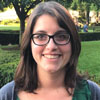
Martina Lessio obtained both her bachelor's and master's degrees in Chemistry from the University of Torino (Italy) where she conducted computational research on materials for solar energy conversion. She earned her PhD from Princeton University in 2017. During her time at Princeton, Martina used computational chemistry to investigate heterogeneous and homogeneous catalysts for converting carbon dioxide to liquid fuels. She is currently a Science Fellow in the Department of Chemistry at Columbia where she continues to work on energy related topics.
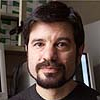
Don Melnick is Thomas Hunt Morgan Professor of Conservation Biology in the
Department of Ecology, Evolution, and Environmental Biology (E3B) at Columbia University.
A faculty member of Columbia since 1981, he was born and raised in and around New York City,
receiving his B.A. from NYU and his Ph.D. from Yale University. For over 25 years Professor
Melnick has used molecular genetics to understand aspects of the ecology, behavior, evolution
and conservation of vertebrates. This research has spanned organisms from frogs to elephants
and continents from Central and South America to Asia and Africa. His work has been published
in numerous technical journals and books, and covered by such popular media as The New York Times,
The International Herald Tribune, and Discovery Channel. Most recently, Professor Melnick assumed
the role of co-Chair of the U.N. Millennium Task Force on Environmental Sustainability, and with the
other co-Chair, Ms. Yolanda Kakabadse, the former Minister of the Environment of Ecuador, he has assembled
an international team that is charged with delivering an action plan for achieving environmental
sustainability to the U.N. Secretary General by 2005.

Paul Olsen the Arthur D. Storke Memorial Professor in the Department of Earth and Environmental Sciences, focuses his research on the evolution of continental ecosystems through study of the pattern, causes, and effects of climate change on geological time scales, mass extinctions, and the effects of evolutionary innovations on the Earth System. Much of his fieldwork deals with the beginning of the Age of Dinosaurs (250 to 180 million years ago), includes drilling and recovery of long rock cores from ancient lakes, and fossil collection from New York and New Jersey to Arizona and Morocco. A National Academy of Sciences member, Olsen has a B.A. in Geology and a Ph.D. in Biology both from Yale University.
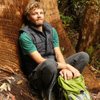
Tammo Reichgelt
obtained his BSc in Earth Science and MSc in Biogeology from Utrecht University in
the Netherlands. He worked as a high school chemistry teacher during his MSc and also worked as a soil-
and soil water pollution specialist. He obtained his Ph.D. in Geology from the University of Otago, New
Zealand, in 2015. His research focus is to investigate the history of Earth�s deep-time terrestrial
environment using the interplay of climate with plant form and function. Specifically, Southern
Hemisphere temperature evolution and global atmospheric CO 2 concentrations during the Cenozoic (65
million year BP up to the present day).

Monica Rouco-Molina received the Veterinary B.S. degree from the University Complutense of Madrid (UCM), Spain, in 2006. After graduation, she started exploring the fascinating world of phytoplankton (microscopic algae), and how these organisms deal with their geochemical environment. She developed her Ph.D. studies at the UCM, and did several research exchanges with the National Oceanographic Centre of Southampon, in England, and with the Institute of Marine Sciences in Cadiz (CSIC), in Spain. After earning her Ph.D. in 2011, she started a research postdoctoral position at Woods Hole Oceanographic Institution, MA, where she focused on studying the physiological ecology of the cyanobacterium Trichodesmium, one of the most important nitrogen fixers in aquatic ecosystems. Monica is currently a Postdoctoral Research Fellow at Columbia, in the Department of Earth and Environmental Sciences, where she continues her research in microbial oceanography. In addition to her research and teaching, Monica has a leadership role in the Center for Microbiology: Research and Education (C-MORE), where she promotes the professional development of students and other postdocs, and work towards enhancing diversity in STEM fields.

Dustin Rubenstein is an Associate Professor of Ecology, Evolution and Environmental Biology.
He is director of the Program in Tropical Biology and Sustainability, and co-founder of the
Center for Integrative Animal behavior. He studies the causes and consequences of sociality and
how animals cope with environmental change. He joined the Columbia faculty in 2009 after
completing a Miller Research Fellowship at the University of California, Berkeley. He received
his A.B. from Dartmouth College in 1999 and his Ph.D. from Cornell University in 2006..
Website
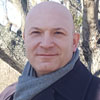
Fabrizio Spagnolo is an evolutionary biologist interested in the evolution and ecology of bacteria, with a focus on adaptation in microbial populations. He holds a BA in Philosophy from Boston University, as well as a MA in Biology and a Ph.D. in Ecology and Evolution from Stony Brook University. He conducts research using experimental evolution techniques in the lab, using controlled conditions to understand evolution as it is happening.

Abigail Sporer graduated from the University of Wisconsin-Madison, where she double-majored in Theatre and French and studied for a year in Aix-en-Provence, France. She later changed fields and earned a PhD in Molecular Biology at Princeton University, where her research focused on the genetic and regulatory control of mating and sporulation in the yeast Saccharomyces cerevisiae. Abigail's current research in the department of Biological Sciences focuses on the regulation of pigment, antibiotic, and signaling molecule production in the pathogen Pseudomonas aeruginosa and several other species of non-pathogenic soil bacteria.


![]()
![]()
![]()
![]()
![]()